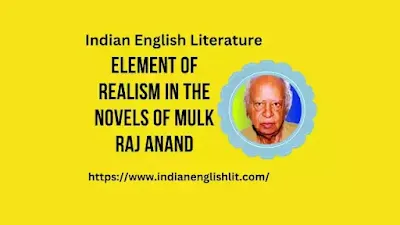Introduction:
Mulk Raj Anand is a realist. He has seen the real life and sufferings and miseries of the under - dog in India. He is a novelist with a social purpose. so, he has exposed social hypocrisy, class exploitation, class struggle, economic injustice and inhuman cruelties imposed on the unprivileged ones by the British rulers in his novels. Other writers focussing on realism are Rabindranath Tagore, Bankim Chandra, Prem Chand, Sharat Chand, Chekhov, Flaubert and Tolstoy who influenced him greatly and from whom he learnt the technique of realism.

Minute Observer of Life:
Anand is a minute observes of life, society and human character. The picture of the Indian society he has depicted in his novels is true to life. The characters are lifelike and real. Even the ugly side of reality has not been left aside by him. Latrines, dirt, squalor, beggars, poor people, diseases and pollution all are beautifully and artistically described in his novels and short stories. He has given the due place to the bottom dogs in the novel. His novels are based in his own experiences and observations of the lives of the outcastes, peasants, soldiers and labourers. According to him all institutions and authorities are means of exploitation and injustice, so he questions them all - temples, laws, religion, money – lenders, zamindars and even British rulers, class distinctions between the rich and the poor, between the tea planters and labourers, between high caste - Hindus and the low caste - Hindus hamper the free development of individuals and create many social evils. The pictures of social injustice depicted in his novels are the reflections of real incidents the novelist saw in his childhood and boyhood. The poor try to rise in their life but fail to do so due to the authorities and social vices prevalent in the Indian society.
His Real Characters:
His characters are the sons of the soil. They are the peasants, the sweepers, the labourers, the poor and hungry people. They are his heroes and most of them were the reflections of the real people he had known during his childhood and youth. He does not treat of Rajas, Maharajas and their mistresses but of the simple people.
Real Social Political and Economic Problems:
Mulk Raj Anand depicts real social problems prevailing in India. The first novel Untouchable deals with the inhuman and unjust authority of caste Hindus over the sweepers the so - called untouchables. It describes a day in a sweeper's life with every realistic circumstance. The untouchables are looked down upon as dirt though they clean the dirt of humanity.
The coolie deals with the realistic life of a coolie, Munoo who leaves his house in the hills and becomes a domestic servant. He works as a coolie in vegetable market, then as an employee in a mill and ultimately as a rickshaw puller for an Anglo - Indian in Simla and after some time he dies of tuberculosis.
Two Leaves and a Bud deal with realistic miserable conditions of the labourers in tea - gardens. They are the bond slaves and the honour and chastity of their wives and daughters is at stake. Anand has the real experience of the sad lives of these labourers in tea - plantations. He says, "… because what I had to say in it was deep in me from the days when I lived for a while near a plantation in Assam and visited Ceylon, and saw the inhumanity and barbarism prevalent there …”
The Village deals with the problem of the landlord's inhumanity and injustice and the poverty of the Sikhs. “The Sword and The Sickle” presents the contrast between the soldiers and the peasants. His Indian heroes do not have mythical contentment in spite of poverty or mystical silence and in spite of being morally wounded, spiritually murdered and socially humiliated. They rebel against the authorities and oppose the high caste - Hindus. Their exploiters are truly and faithfully exposed and condemned.
Conclusion:
Anand's novels are based on his own experiences and observations of the lives of the outcastes, peasants, soldiers and labourers. He wrote that he was of his time and the atmosphere of the thirties with its hangover from crisis influenced him strongly. He was son of a coppersmith turned soldier, and of a peasant mother and so he could write well of peasants, Zamindars, soldiers and labourers. He hated authority and privileged power of the high class people. For him Authority is the Fate of the Greek Tragedy or the villain of the Shakespearean Tragedy.






